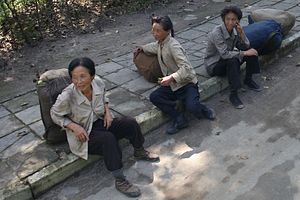North Koreans are resentful of the state meddling with entrepreneurial efforts to supplement the flailing public distribution system, a rare survey of people inside the secretive country has found.
Crackdowns on private business were among the biggest sources of anti-regime sentiment felt by North Koreans contacted by the U.S.-based Center for Strategic and International Studies, none of whom considered state rations sufficient to meet their needs.
Among other complaints, respondents voiced discontent with the regime seizing assets and jailing citizens for selling goods on the black market.
Informal markets make up a large slice of the once solidly socialist economy, since a massive famine in the 1990s left the official rationing system in tatters. Last year, a survey by Seoul National University found that more than 75 percent of defectors living in South Korea had engaged in private markets and bartering in their homeland.
“Through reliance on the North Korean system alone, these citizens are not able to achieve their standards for a good life,” CSIS said of its findings, published Tuesday for its “Beyond Parallel” project. “North Koreans are angered when the regime interferes with the people’s entrepreneurial efforts to improve their lives on their own.”
The survey reached 36 North Koreans spread across seven provinces and the capital Pyongyang, with their ages ranging between 28 and 80. The occupations represented include doctor, company president, homemaker, factory worker, barber and cook, according to CSIS.
Although too small to be representative, the study is notable for gauging the opinions of people still inside North Korea, since most surveys rely on defectors. CSIS did not respond to questions from The Diplomat about how it carried out its work inside one of the most closed countries on earth.
Sokeel Park, who works with defectors as director of research and strategy for the nonprofit Liberty in North Korea, said the findings matched his own observations of discontent among North Koreans.
“The findings released so far by CSIS very much tally with what we learn from North Korean defectors about social trends inside North Korea,” Park told The Diplomat. “This confirmation is valuable because North Korea is the most closed and difficult-to-research country in the world — particularly on public opinion — so it is useful to see that insights gained from current residents mirrors insights from those who have defected, even taking into account the methodology caveats.”
Park said the data poured doubt on the perception that defectors are unusual in their animosity toward the regime, which has sometimes been used to qualify or even dismiss their testimony.
“This also gives some support to the idea that defectors are not necessarily that unique in terms of their views and experiences compared to those around them who didn’t defect — rather the difference was that they had an escape route open to them and the risk tolerance to go through with it,” he said.

































